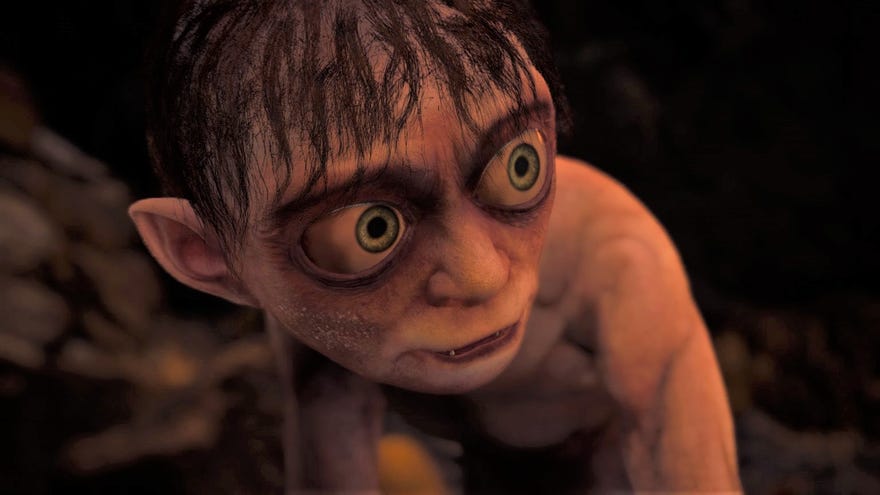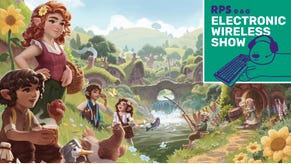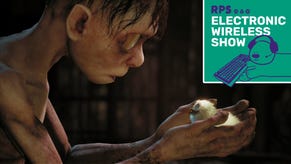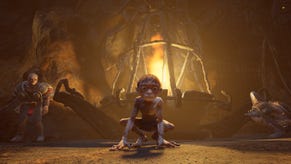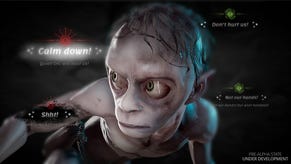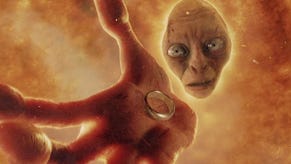The Lord Of The Rings: Gollum review: I hates it
This shall not pass
I don’t like being mean about games, but I do like being honest about games, and, yeesh, is The Lord Of The Rings: Gollum putting me between a rock and a hard place. The bottom line here, folks, is that Gollum is not good. Just as the ring corrupted Sméagol, playing Gollum has made me a husk of a human being, a twisted and bitter shadow of what I used to be. Playing it for more than 30-minutes at a time would make me feel unsettled, prompting some kind of feral need to scoop my brain out of my skull.
The Lord Of The Rings: Gollum takes place after Bilbo finds the ring, but before Frodo and Sam’s run-in with our grimy gremlin. Put simply, the story runs parallel to the events in The Fellowship of the Ring, but instead of prancing through Hobbiton and ogling at Rivendell, Gollum is mostly burning to a crisp within the bowels of Barad-dûr in fiery Mordor. He does eventually make it to the beautiful Woodland Realm in Mirkwood, but the Elven king Thranduil (aka Legolas' hot dad) and his army don’t treat him very nicely, so that doesn’t turn out very well either. He’s got it rough, but Gollum perseveres. He wants his shiny preciousness back, after all, and will do anything it takes to get it. He’s got drive, and as a fellow fan of sparkly jewellery, I can respect that.
But drive isn't enough to redeem the turgid adventure that follows. Part of the problem lies with having Gollum himself as the protagonist. After all, what more is there to say about this clearly tragic symbol of how the ring can corrupt even the most ‘innocent’ and ‘pure’ into grubby, greedy goblins?
It seems Daedalic have struggled with this question, too. Throughout Gollum’s 20-odd hour run time, it quickly becomes clear they didn’t know what to do with him. Plot points are picked up for one chapter and then immediately discarded in the next, while others are drawn out for far too long. It makes the story as a whole feel disjointed, and his sole questline of finding the One Ring simply isn't strong or interesting enough to sustain it. While it does pick up somewhat in the second half, the first eight hours where Gollum is trying to escape the slave camps beneath Barad-dûr are nothing short of a slog.
.jpg?width=690&quality=80&format=jpg&auto=webp)
For example, during Gollum's imprisonment, he has a cellmate who turns out to be the king of Gondor. Holy shit, that's a big deal, right? After a couple of dreary missions with him, it feels like the game is gearing up for a big revelation. Will he escape with Gollum's help? What does his disappearance mean for Middle-earth? Doesn't this leave Gondor incredibly vulnerable? Nope. After a failed escape plan, you just don't see him for a bit and his dead body appears in your cell during not long later, the implication being that he dies from starvation. This happens consistently throughout Gollum as storylines are picked up and dropped almost immediately.
It's very jarring, but take a look at LOTR canon and it becomes more obvious why. Gollum is supposed to be stuck behind the Black Gate for years, and I wouldn't be surprised if Daedalic's writers were bound by similar story constraints. However, when everyone already knows what Gollum's like when he does eventually meet Frodo and Sam, each mission and storyline in the game also can't help but feel like filler. As I’m wrangling weird bull-like creatures into their pens for unimaginative chase sequences, setting light to barrels of stinky gas, and running around a burping lava pit finding the dog tags of dead slaves, I’m constantly thinking, 'What is the point here? Why is this important?' It’s not. It’s just busy work, and it’s a constant issue throughout.
_1QKK0bc.jpg?width=690&quality=80&format=jpg&auto=webp)
_ZzAtHq7.jpg?width=690&quality=80&format=jpg&auto=webp)
_HCCq6w4.jpg?width=690&quality=80&format=jpg&auto=webp)
Gollum is an entirely linear game, made up mostly of a combination of climbing and stealthing bits. With climbing, you’ve got your typical rock scaling, ledge grabbing, and acrobatic swing jumping (that's right, Gollum is two-time Olympic gymnastics gold medallist now). These sudden, Assassin's Creed-style parkour abilities feel like an odd fit for Gollum at first, but over time they gradually feel more appropriate for something that is very small and weak in a world full of big, terrible things. Or they would if not for the awful controls.
_HX6uSi5.jpg?width=690&quality=80&format=jpg&auto=webp)
I originally tried to play Gollum on my gaming PC, but the game kept crashing every time I booted it up, so I used my Razer Blade 15 instead. My specs can be found in the info box but getting the game to run anything above its preset 'Medium' graphical settings was basically impossible. So yeah, if my screenshots look a bit crunchy, that's why.
If at any point you need to be careful or agile, you can forget it. I often resorted to crawling during these moments, as it made Gollum slower and easier to control. But even that was no guarantee. The times I swore I'd missed a jump, Gollum would magically snap onto the correct ledge, but when I thought I timed something perfectly he would yeet himself in the wrong direction. The camera is easily the game's most devious villain, so focused is it on Gollum's movement that it gives you little wiggle room to control it exactly to your liking.
Stealth sections are equally uninspiring and mainly involve crawling around in the shadows and shrubbery, sometimes throwing a stone at something metal to distract guards, a la A Plague Tale. If you get caught it’s an instant fail, but Gollum has heat vision (like the eagle vision in Assassin's Creed or Witcher sense in The Witcher) highlighting who is stomping and where they are. These sections aren't as irritating as the climbing, but are still unexciting, especially when you sneak so close to a guard that they must have AirPods in their ears on full blast (probably listening to the hit indie game podcast Indiescovery, no less). It completely takes the thrill out of it.
.jpg?width=690&quality=80&format=jpg&auto=webp)
Combat is out of the question, naturally, but you can do a murder sometimes when an orc isn't wearing a helmet. However, deciding whether to kill someone or not feels poorly handled here, as it triggers Gollum's split personality with Sméagol to turn up and engage in lengthy bickering sessions that ultimately boil down to being a mischievous little stinker or a cold-blooded murderer. Gollum and Sméagol's two personalities will each try to gain control, leaving you to decide which side to lean into during these inner dialogue arguments. Favouring one over the other will allegedly change how characters see and interact with you, but I didn't notice anything, honestly. It’s also not so much a morality system as it is a simple decision: do you wanna kill the orc or sneak past him? Others have no impact at all. Should we say something nice to our newbie cellmate, or some awful shit like how he's going to die down here, how he'll never see light again, and how his body will rot, etc etc? Doesn't matter, because there's no enduring sense of consequence here.
All that said, the world design does have a lot going for it. There's a lot of pleasing detail in the architecture and the lighting is gorgeous, particularly during a scene where Gollum is climbing through a spider cave and bright white light illuminates all the spiderwebs. Barad-dûr also has its moments, the firepits and bubbling lava look beautifully luminescent within the tower's dark gullet. Mirkwood too, with the trees and the autumnal colour palette, looks lovely.
_GLxdUoD.jpg?width=690&quality=80&format=jpg&auto=webp)
.jpg?width=690&quality=80&format=jpg&auto=webp)
.jpg?width=690&quality=80&format=jpg&auto=webp)
But even these moments of spectacle can't hide what is ultimately a very dull game. It's also quite janky, and I spotted plenty of canned animation loops, characters getting stuck in scenery, and Gollum clipping or jittering through the environment on several occasions to name just a few. But even if it were technically sound, Gollum is simply a game that fails to expand the world of Middle-earth in any meaningful way. There are glimmers of something here, but like the ring itself, this is best chucked into the bowels of Mount Doom and forgotten about forever.
This review is based on a review build of the game provided by the publisher Daedalic Entertainment.
